An automotive battery management system (BMS) is the brain of the battery pack of an electric vehicle. It ensures every cell operates within safe voltage, current, and temperature limits, while optimizing the overall power performance and extending battery life. Every BMS itself is a robust and high-power printed circuit board assembly (PCBA).
PCBONLINE, a one-stop OEM PCB manufacturer, provides high-reliability BMS PCBA services that meet the automotive industry standards. From prototype to mass production, PCBONLINE offers automotive BMS with IATF 16949–certified quality, 15-year traceability, and engineering assistance in high-voltage, high-current electronics.
What Is a Battery Management System (BMS)?
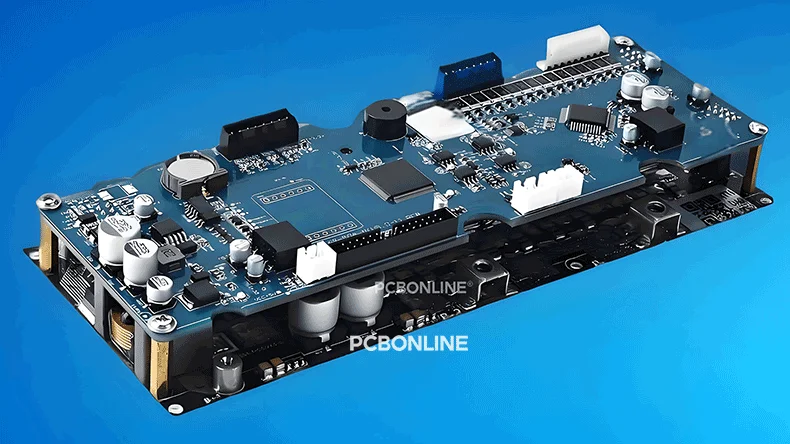
In an automotive battery pack, there is a battery management system, a cell connection system, and cells. The BMS is an electronic control unit that monitors and manages rechargeable batteries. It performs these functions:
- Measuring individual cell voltages and pack current
- Estimating State of Charge (SOC) and State of Health (SOH)
- Protecting against overcharge, over-discharge, and overcurrent
- Balancing cell voltages for optimal performance
- Communicating with the vehicle control unit via CAN bus or other protocols
In electric and hybrid vehicles, a BMS ensures battery safety, durability, and efficiency, directly impacting the driving range and system reliability.
Role of the PCBA in Automotive BMS Performance
The Printed Circuit Board Assembly (PCBA) interconnects all the sensing, control, and communication functions within the automotive BMS. It carries microcontrollers, sensors, balancing circuits, isolation devices, and connectors. All components and the circuit board are operating under harsh automotive conditions.
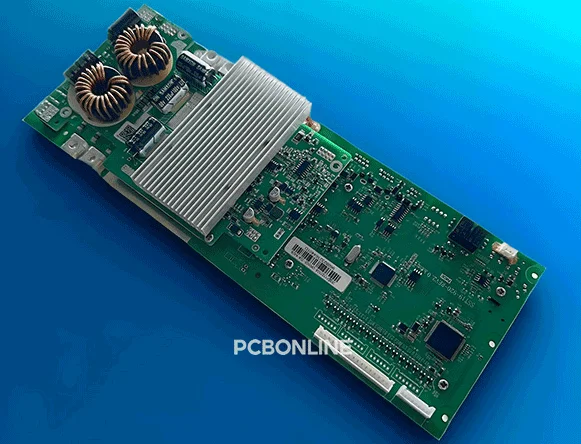
An automotive BMS PCBA must deliver:
- Stable signal integrity under high-current environments
- Precise voltage and current sensing, often down to micro-ohm accuracy
- Thermal and mechanical reliability in wide temperature ranges
- Resistance to vibration, moisture, and contaminants
- Long-term traceability for up to 15 years or more
What is Needed for Manufacturing Automotive BMS PCBs
It's important to ensure your automotive BMS PCBA manufacturer has turnkey PCB manufacturing and assembly capabilities for automotive BMS. PCBONLINE has all the manufacturing and assembly capabilities for automotive BMS PCBA.
In BMS CB manufacturing, we can:
- Can inlay, mount, and embed copper busbars in PCBs for high-currents of the BMS
- Make PCBs with copper thickness from 1oz to 14oz for current-handling paths
- Ensure precise controlled impedance and differential pair routing
- Apply ENIG/ENEPIG/immersion silver finishes for low contact resistance
- Have AOI, copper thickness inspection, and flying-probe testing for 100% inspection coverage
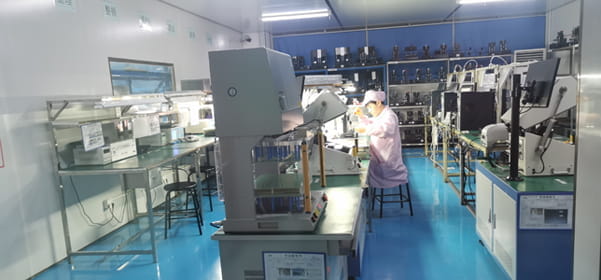
In PCB assembly for automotive BMS, we can:
- SMT and through-hole assembly from prototypes to mass production
- Pre- and pro-reflow AOI, first-article inspection, and 100% X-ray inspection
- Four-terminal resistance testing and FCT functional testing for every BMS PCBA
- Full traceability through MES and ERP systems, data stored for 15+ years
Besides, we provide one-on-one engineering support. PCBONLINE's R&D team supports from the early design stage to mass production, including:
- Stack-up optimization for high-voltage BMS
- Material selection (Rogers, FR408HR, S1000-2M, and others)
- DFM/DFT feedback and Gerber review
- Prototype validation and PPAP submission
In the prototype stage, we offer rapid PCB fabrication, PCB assembly for initial functional testing, and verification of manufacturing process parameters, thermal behavior, and EMC performance.
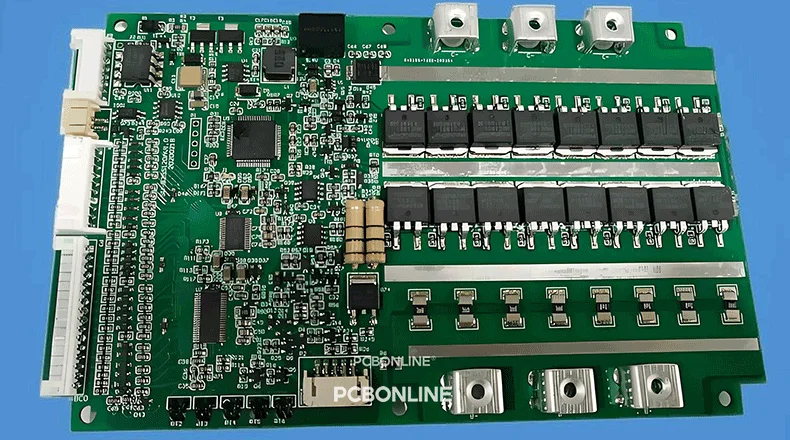
In the delivery of PCBA prototypes, we attach a full submission of PPAP Level 3 documentation, including FMEA, MSA, and process capability reports.
In mass production of the BMS PCBAs, all PCBA units are serialized and traceable, meeting OEM and Tier-1 requirements.
Design Requirements for Automotive BMS PCBs
Designing a PCB for automotive battery management involves balancing high-voltage isolation, low-resistance current paths, and dense analog/digital circuitry. The design considerations include:
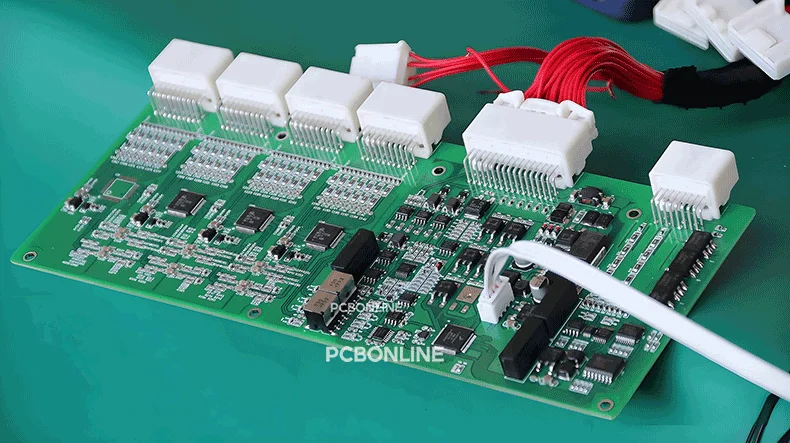
High-voltage and isolation design
Electric vehicles often operate with battery packs exceeding 400V. BMS boards must include isolation barriers between high-voltage and low-voltage circuits, following creepage and clearance rules defined in IEC 60664 and ISO 6469-1. PCBONLINE engineers use controlled dielectric materials and multilayer structures to ensure electrical safety.
Precision current sensing
Accurate current measurement is essential for SOC and SOH calculations. Automotive systems typically adopt four-terminal (Kelvin) sensing layouts to measure micro-ohm shunt resistors precisely. This test technique eliminates parasitic resistance from copper traces, ensuring accuracy and long-term consistency.
Thermal management
The balancing circuits and MOSFET drivers in BMS generate heat. PCBONLINE's advanced board stack-up design uses thick copper layers (2–4oz) and thermal vias for efficient heat dissipation. For high-power BMS units, metal-core PCBs (MCPCBs) or hybrid FR4–aluminum structures can be applied.
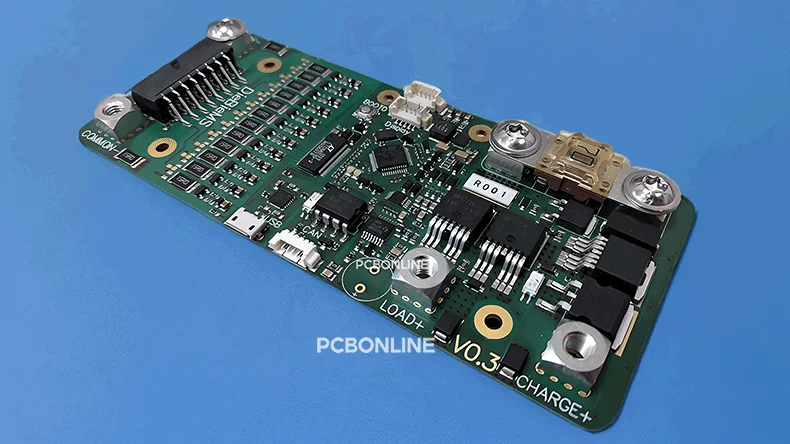
Signal and communication integrity
CAN, CAN FD, and LIN buses are standard automotive communication protocols. To guarantee stable data exchange, PCBONLINE engineers implement controlled impedance routing, differential pair design, and EMI shielding techniques on multilayer PCBs.
Reliability and durability
All materials used for BMS PCB manufacturing must withstand wide temperature ranges (–40°C to +125°C) and comply with AEC-Q200 and UL 94V-0 standards. Conformal coating and selective potting are available for additional environmental protection.
Quality Control and Traceability for Automotive BMS
PCBONLINE implements comprehensive inspection and testing processes for every BMS PCBA:
- In-circuit test for solder and open/short checks
- Functional test simulating real operation
- Four-terminal micro-resistance measurement for current sensing accuracy
- Thermal aging and vibration testing per ISO 16750 standards
- X-ray and AOI for hidden defects
- Final quality report and COC (Certificate of Conformance) issued with each batch
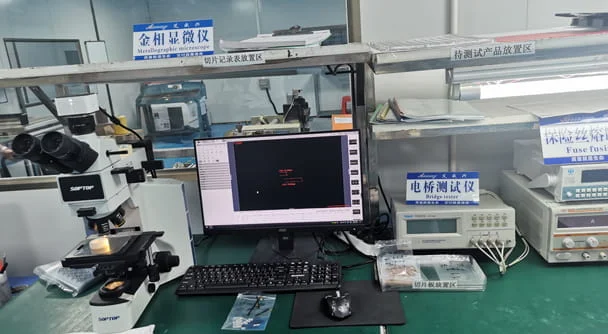
Electric vehicles are expected to operate for over a decade. PCBONLINE's automotive PCBA traceability system guarantees all manufacturing and component data can be retrieved for at least 15 years after production.
The 15-year data transparency supports OEMs in warranty, maintenance, and recall management, aligning with global automotive quality expectations.
One-Stop Battery Management System Manufacturer PCBONLINE
If you want battery management systems to develop your battery packs for EVs, hybrid EVs, solar energy systems, etc, you can work with PCBONLINE for one-stop BMS R&D and manufacturing.
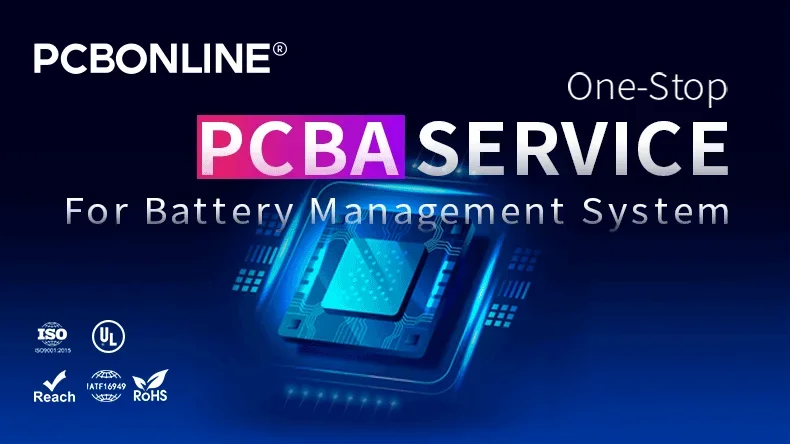
PCBONLINE is a source factory manufacturer, with two large advanced PCB manufacturing bases, one PCB assembly factory, reliable supply chains, and an R&D team for BMS development.
PCBONLINE can provide all the R&D for your BMS project according to your battery pack specification and feature requirements, or take part in your development from the early stage.
PCBONLINE manufactures the BMS PCB, sources components, and provides turnkey PCB assembly until the battery management system is made and tested successfully.
Besides PCBA manufacturing, PCBONLINE has long-term cooperation with the top 3 mold and enclosure manufacturers to provide custom molds and enclosures for BMS manufacturing.
What's more, PCBONLINE has rich experience in CCS manufacturing and can develop both the CCS and BMS together for your battery pack.
PCBONLINE offers free prototyping/sampling and PCBA functional testing for BMS massive production and can solve all issues to ensure smooth processes and successful results.
PCBONLINE has so far developed and manufactured quite a few battery management systems. To get a quote for your BMS project, please contact info@pcbonline.com.
Conclusion
Automotive BMS are custom-designed and manufactured, meeting the IATF 16949:2016, IPC-A-610 Class 3, and 15-year traceability requirements. Partnering with an experienced manufacturer like PCBONLINE ensures that your BMS products meet the strictest automotive standards, from design validation to mass production and long-term field reliability. Contact PCBONLINE today to discuss your BMS PCBA requirements and get professional support
Battery Management System Manufacturing at PCBONLINE.pdf
CCS Product Introduction - PCBONLINE.pdf





